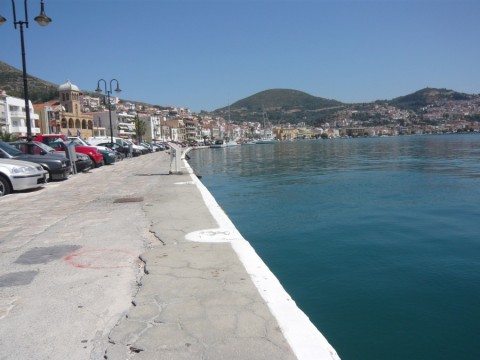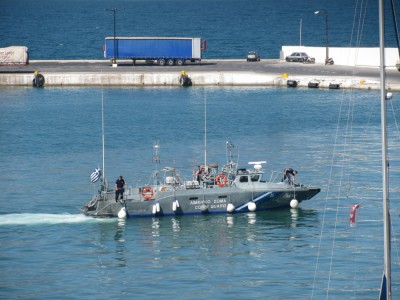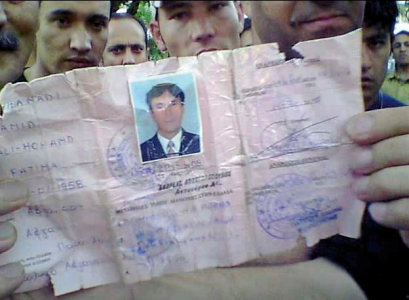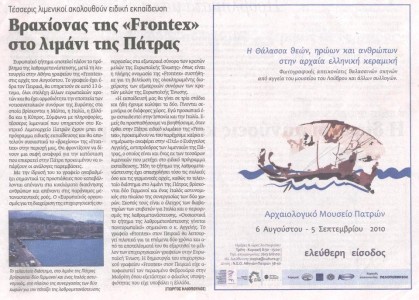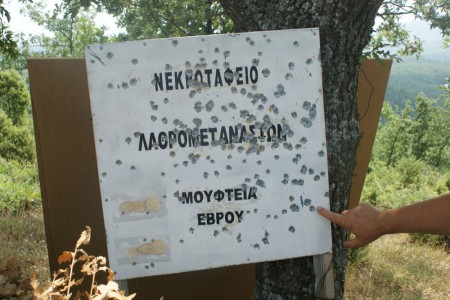Today, Saturday, was the designated Frontex action day in Samos. We scored our first victory in the morning when all coast guard and Frontex ships withdrew from the port, disappearing somewhere. Up to now, they have not returned. The image below shows where they usually park their ships during the day… it is empty. We demilitarised, de-frontexisised Vathy, at least for a day.
Archive for the 'Locations' Category
Page 7 of 12
In the last few days we gradually arrived in Samos and found a totally unexpected situation. The huge detention centre above Vathy is empty, all detainees have been transferred off the island, presumably to Athens, where they are either held in another detention facility or are released with the infamous White Paper.
Currently, there is an Italian Guardia Frontera ship in the harbour representing FRONTEX. The Dutch coast guard is present with a speedboat. From our observations, the latter basically go around and drink coffee at the various beaches. The Greek coast guard has two boats in Vathy, one of them is broken, though. The Italian Frontex ship leaves every night at 10 p.m. and returns in the early morning – but these days they are not very “successful”: According to what they say, they have not caught anybody during the last weeks. Inhabitants told us that still some people arrive on the island but without being caught. But compared to last year, arrivals have dropped dramatically. According to a chatty coast guard officer most refugees now choose the route via the Evros region in the north of Greece. The few people caught on the island are imprisoned in one of three police stations on the island and usually not taken to the detention centre, but sent to Athens straight.
We were a bit slow to pick this news up, and there has already been extensive writing about the hunger strike, so all we want to do is to turn your attention to this ongoing struggle and urge you to support it in any way possible. You can start reading with this post of Devious Diva (true blog slogan!), and perhaps this search query which should take you further. All the best to the hunger strikers, we fear for your lifes!
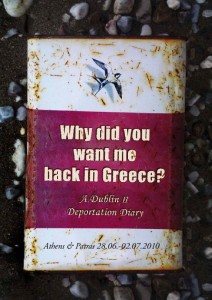
Why did you want me back in Greece?
, ask the refugees being returned due to the Dublin II regulation from different other European countries. The deportation diary carrying the same name evolved out of a short visit in Athens, where activists from the newly founded infomobile project conducted interviews with refugees affected by this European regulation.
The findings, based on interviews with the people affected, are shocking and deeply disturbing. For although every story of flight to and within Europe is different, if we were to summarise, there are two main conclusions that need to be drawn.
Well, well, nothing is ever moving as fast as said. A new article in The Economist brings the news that apparently, the opening of Frontex’ Branch Office in the port of Piraeus will be delayed until October, after it was supposed to first open in spring, then in August.
There are two more aspects in the article that are worth noting, summarised in this paragraph:
So Brussels is sending in the cavalry. Frontex, a Warsaw-based agency created in 2004 to manage the EU’s external borders, will open a pilot office in the Greek port of Piraeus in October. Earlier this month its executive director, Ilkka Laitinen, went to Athens to finalise the plan with Greece’s home-affairs minister, Michalis Chrisochoidis. There was much talk of “milestones” and “adding value”. But there were hints of frustration behind the smiles. Mr Chrisochoidis welcomed the symbolism of the move but says in practical terms it will be “a drop in the ocean”. As for Frontex, squeezed by budgetary and personnel constraints, Mr Laitinen politely describes its job as “a challenge”.
Well, the Economist might have it the wrong way, since it also credits to job of managing the EU’s external borders
to Frontex, which is not really true. However, the image of the cavalry
is interesting, as it might still be sufficiently describing the role of Frontex in Greece: They don’t come to support, they don’t come to coordinate, they come to get the job done, and that by any means necessary. We have already described what that means: Maximising border “security” by all means, minimising the respect for human rights and international law. Or is this again a misconception, citing the drop in the ocean
? We will be in Greece to find out.
Just to keep you updated on the activities of Frontex in the Aegean, we dug out this recent article from a local newspaper, reporting about Frontex in Patras. Is the advertisement next to it not great? Yes, the Mediterranean used to be an area of travel, exchange and commerce, why did we turn it into a mass grave?
Our friendly translator says:
4 coastguards of Patras Central Post Authority are following a special training program and will be the Frontex “branch” in Patras. They will report on the current situation for the implementation of the appropriate interventions.
[…]
Training consists of 3 levels and we completed two of them. Seminars are taking place in several countries. Me, for example, I have been trained in Spain and Italy. We will try to help the Frontex specialists group which will visit us, by providing crucial information, Evangelos Agelis, vice-president of Patras coastguards and one of the 4 coastguards in special training program, said.
[…]
In Patras port 2 german and 1 italian policemen are taking part in passport controls in order to reduce illegall migration.
This year, the Schengen Agreements turn 25 years, supposedly providing for passport-check-free travel in Schengenland. So how are those three border guards mentioned in the last paragraph controlling?
Answer to the vice Prefekt in Evros region Mr.Papaioanou.
On the 12.08.2010, we heard you on Thraki T.V , Mr.Papaioannou saying that this mass grave we have seen with our own eyes, doesn’t exist. You said: It was only some friends who buried their friends there and that the people who put this information on a blog are liars.
Since we, the ‘INFOMOBIL welcome to europe network’, are the ones who went to Evros region, in a group of 8 people from different european countries – among us journalists and fotojournalists – trying to find out if the afghan husband of a woman we know, who was lost in the river Evros on the 25 june 2010 (together with 2 other afghan men) to find out if he is alive…
We visited 16 places in Evros, mainly detention prisons but also hospitals, to try to find out.
During the first seven months of the year 2010, 38 human beings died while attempting to cross the heavily guarded Turkish-Greek border. The corpses of the dead are being transferred to the department of forensic medicine of the university clinic of Alexandroupoulis. Since they can often not be identified, only a DNA-test is being carried out so that relatives can still gain certainty.
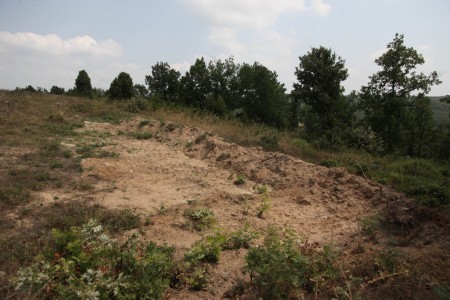
On 25th of June 2010 19 people drowned in the river Evros/Meriç. 14 corpses washed ashore on the Greek side and were brought to the university clinic by an undertaker from Orestiada. After the dead had been examined and registered, the undertaker brought them to a village of the Turkish minority on the mountains above Souflí for them to be buried on muslim cemetery.
Continue reading ‘Mass grave of refugees in Evros uncovered (1 Update)’
Samos is one of the Greek island off the Turkish coast. At the closest point, you have the feeling you can easily touch the other side if you stretch your arm a little. Not surprisingly, many refugees and migrants attempt to cross the border to the European Union here with small boats.
In 2007, a new detention centre was opened on the hills above the island’s capitol Vathy. Before, migrants were detained right in the city centre, behind the main church and the city hall, in the first floor of an old, run-down building. All those that passed this jail said that the conditions were unimaginable and made many people sick. With funding from the European Union, the new detention centre is nothing like that. It consists of 14 buildings made from metal, most of them are used for the detainees while some are administrative buildings. The whole camp is surrounded by a double barb-wired fence, CCTV cameras as well as loudspeakers are everywhere: bidirectional communication to the advantage of the guards. The camp even has a children’s playground as well as a basketball court. Too bad that there are no basketballs available, so the court is mainly used in summer, when the capacity of the camp does not suffice and newly detained migrants have to sleep there, on the bare ground (like in 2009).
In 2009, 150.000 irregular migrants were intercepted in Greece, which amounts for 75% of all interceptions in the EU. Even though in 2010, this number is likely to drop again, it is clear that the closure of other routes to Europe (West Africa to Spain, Libya to Italy/Malta) has made Greece the presently last remaining gateway to the EU, turning it into a embattled ground where the EU is intervening decisively.
There are three tested responses to irregular migration, and the operations of Frontex in Greece and the Aegean have elements of all of them. The first would be to integrate Turkey into the border regime (similar to the case of Libya). On an institutional level, Frontex is trying to connect with the Turkish coast guard and to involve them in joint maneuvers and also seeks a working agreement with the Turkish border authority. But also Greece and the EU are trying to improve their cooperation with Turkey on migration matters: While Greece and Turkey have a readmission agreement (which Greece would like to extend, since practically, its functioning is questionable), the EU has been negotiating such an agreement for many years with Turkey, albeit without success so far. Functional readmission agreements would force Turkey to readmit not only nationals, but all irregular migrants who can be proved to have entered Greece and the EU via Turkey. This would shift the responsibility for securing borders and inhibiting the movements of migration to Turkey.
